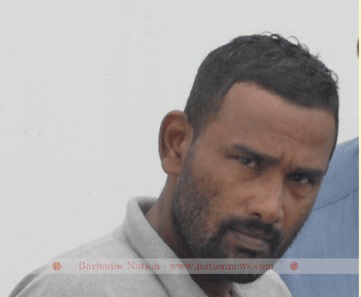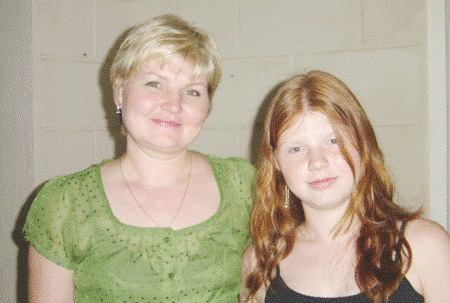(Barbados Nation) John and Larissa Jackson have never been able to pick up the pieces of their lives after the gruesome death of their 16-year-old daughter Anna Druzhinina ten years ago.
Now they are grieving all over again after finding out last week that the Caribbean Court of Justice (CCJ) reduced the 25-year sentence of one of her killers, Teerath Persaud, to 18 years. Persaud, 51, is originally of Walton Hall, Essequibo Coast, Guyana. Persaud’s sentenced was reduced by the CCJ on the grounds that there should have been parity with his co-accused. Omar McColin, his partner-in-crime had received 16 years from the Supreme Court.
Speaking from their home in Spain, John said after the 2008 crime in which Anna was bound and gagged, a wire placed around her neck and then hanged from a rafter, he thought her killers would receive the maximum sentence.
“After what he [Persaud] did I thought there would not be any question of it. To take a little girl’s life, an innocent child just 16 – to torture her; to degrade her. How could I think anything otherwise than they would throw the book at these people?

“I knew Persaud would never get hanged because Barbados doesn’t hang people, but I truly expected, with the abhorrence of normal human beings against such an animal that would just torture and kill a little girl, there would be no question in anybody’s mind this man needs locking up forever.”
John said the crime had taken a toll on Larissa, 46, a Russian nurse whom he met and married when Anna, her only child, was seven years old.
“At the moment she’s virtually disabled and she can only stay alive on drugs,” Jackson said of his wife.
“She needed brain surgery and she couldn’t get it because of our financial situation so they did an operation and fit her with an electronic part so now she gets continuous medication pumped into her body with a tube.”
A few years after Anna’s death the heartbroken couple left Barbados for England, John’s birthplace, before settling in Spain after Larissa got critically sick.
“We lost everything. I worked all of my life at Palmers farming before I opened the store. Everything I worked for disappeared the day we got on a plane and left Barbados five years ago,” said John, who lived here for 35 years.
His son Simon now operates So-Lo while another son died two years ago of leukaemia. He also has a 26 year-old daughter who lives in England.
John sobbed uncontrollably as he recalled the night of the gruesome crime.
“We knew something was wrong because when we got home the house was in darkness. Larissa went up the stairs first and then suddenly there were flames running across the floor. I just ran into the room and tried to stamp it out. I was stamping out the flames and out of the corner of my eye I saw Anna lying on the bed. I said, ‘Anna, what are you doing?’ And she didn’t answer.
“When I got the flames out, I sat on the bed and that was when I saw that her hands and feet were tied and a cloth was around her neck.
“She was lying face down on the bed and when I turned her over there was blood in her eyes. I put her face against mine and she was still warm but I knew she was dead.
“Larissa ran into the room screaming that the house was on fire but all I could do was hug Anna and cry. I said, ‘Larissa, they’ve killed her; they’ve killed Anna’.
“She looked at me and she just went crazy. I sat with Anna in my arms and I truly thought, God just let me die – let the house burn down.”
The couple was also shocked when they later discovered that the two men were hiding in the house the whole time.
Of Anna’s death, he said Persaud did it to punish them.
“Anna’s father had committed suicide when she was a toddler and that is what hurts. Persaud knew this and he killed Anna in the same way by hanging her at the top of the staircase.”
He said the only comfort in the sordid scenario was the fond memories he and his wife had of Anna.
The CCJ decision
The CCJ ruled on May 5th that Persaud’s manslaughter sentence be reduced from 25 years to 18 years. With a discount for time already spent in custody, Persaud would serve a remaining 13 years and 339 days starting from 11 December 2012.
On 3 February 2010, McCollin pleaded not guilty to murder but guilty to manslaughter. At his sentencing hearing, the DPP and McCollin’s attorney agreed to facts in a previous statement given by McCollin to the police which essentially portrayed Persaud as the main conspirator. Having considered the circumstances of the case, Justice Worrell sentenced McCollin to 16 years’ imprisonment less 20 months that he had already spent on remand.
On 11 September 2012, Persaud also pleaded not guilty to murder but guilty to manslaughter and the DPP and his attorney also agreed to facts in a previous statement given to the police that portrayed McCollin as being the main conspirator. The judge in this case, Justice Crane-Scott, found that this was a serious case of manslaughter on the borderline of murder with numerous aggravating factors and so she said that in her sentencing process she would use a starting point of 30 years. From this 30 years she reduced the sentence by 4 years for Persaud’s early guilty plea and an additional year for his previous clean record, his cooperation with the police, as well as his expression of remorse. The judge therefore sentenced him to 25 years imprisonment with a discount of 4 years and 26 days for time already spent in custody.
Persaud took his case to the Barbados Court of Appeal on two grounds, first that his sentence was unreasonably longer than McCollin’s and secondly, that the sentence had been excessive because of the misapplication of the aggravating and mitigating factors in the case. However, the Court of Appeal dismissed the appeal.
Persaud then appealed to the CCJ arguing essentially the same grounds argued in the Court of Appeal. The CCJ concluded that the concept of parity in sentencing was an important principle in the law of sentencing and that persons whose personal circumstances are similar and whose legal liability for the offence are relatively the same should receive comparable sentences. The CCJ was not convinced that the case against Persaud was so dramatically different from that against McCollin that he should be sentenced to an additional term of 9 years imprisonment.
The CCJ also found that the starting point of 30 years adopted by the judge in Persaud’s case was too high and that she should have started at 25 years. The Court said that an additional 2 years should be added for the aggravating factors in this case but gave a discount of 1/3 for his early guilty plea. This resulted in a sentence of 18 years.










